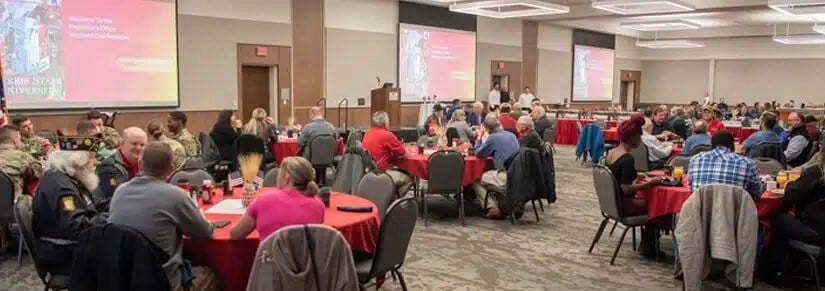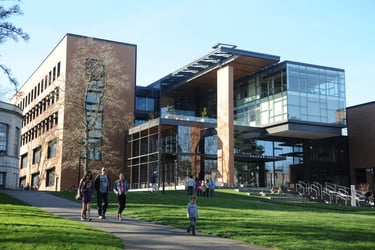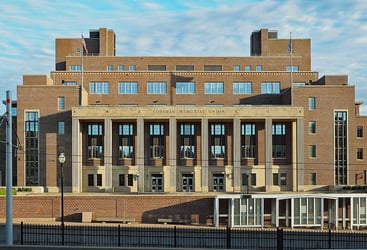All it takes is a glance at the headlines to see that staffing shortages are everywhere. Blame “The Great Resignation” or any of several other drivers, but the fact remains: it’s hard to attract, hire, and retain good people.
However, thanks to hard work and a unique blend of training techniques, marketing, technology, and engagement initiatives, the David L. Eisler Center at Ferris State University can tout an employee retention rate above 90%. The strategies used there have reduced employee turnover and created a student workforce that is supported, engaged, and happy.
Leveraging Technology to Streamline Scheduling
Eisler Center is Ferris State’s go-to destination for a wide variety of events, including meetings, training sessions, conferences, bridal expos, and more. Gatherings range from a few attendees to 700 people, and it’s a busy facility buzzing with activity every day of the week.
In order to stay on top of all the activity, the scheduling team uses a state-of-the-art, web-based event scheduling solution that streamlines event management, making it easier for the center’s customers—students, staff and faculty, and campus guests—to interact with event coordinators about their sessions. It also helps team members communicate more effectively internally and complete tasks more efficiently.

Having the right scheduling solution was critical for Eisler Center after the pandemic. The facility is primarily used by on-campus individuals and organizations; however, during the pandemic, there was a sharp increase in requests from external entities due to the closure of other conference centers in the area. Fortunately, center staff used creativity and unique scheduling features to take the uptick in stride and continue to provide exceptional customer service.
Staff regularly use a feature that automatically sends emails to external customers before scheduled events that provides essential information, including details on a challenge common to universities: parking. It explains where to park and how to get parking passes, saving event coordinators countless calls and emails from meeting hosts and attendees with questions about that key logistical element.
During the pandemic, the number of events fell compared to the 4,539 events in 2018 and the 4,223 in 2019. But an increase in facilities use by campus guests in 2020 and 2021 was seen as a successful test of the scheduling system for use with external customers. Now, in the 2023–24 event year, projections are showing a record number of events, even beyond the high of 2018.
The Eisler Center also uses its scheduling system to conduct automated and convenient post-event surveys that are then used to help the scheduling team understand what they can do to create even better customer experiences.

Recruiting the Right Candidates
Engagement—from recruiting to employee recognition—is central to Eisler Center’s staffing success. Recruiting has historically been largely through referrals; however, management has augmented that approach by engaging with the hospitality program on campus to find employees interested in management positions. These students understand how event services work and are ideal candidates to join the scheduling team. They can contribute to the team’s success while furthering their understanding of event management practices on their way to their degree.
This symbiotic relationship evolved from scheduling department personnel doing presentations for the department in which students are studying hospitality. Topics have included how Eisler Center’s scheduling operations are managed, what are some of the challenges presented by different types of events, and how those challenges are addressed. Eisler Center professional staff have also been invited to serve as featured speakers when the hospitality program has hosted conferences.
Today, that relationship has expanded, with the student center’s scheduling department taking on its first hospitality intern. That engagement included the department developing a document with goals and expectations for high-level hospitality students that includes guidelines for crucial tasks like reviewing and approving event requests, handling survey data, and maintaining customer lists.
The Eisler Center did need to decrease student employment during the pandemic, but the building was still open, and classrooms were set up in large event spaces. The center is also home to a campus store and dining services. Student staffing is generally between 25–30, with up to nine student managers, eight information assistants and office support staff, and 10 set-up staff. The department offers cross training if students are interested, which allows them to pick up shifts that become available. Professional staff includes an associate dean of student life who is also director of the Eisler Center and the Center for Student Involvement, which includes Greek Life and campus activities. A set-up coordinator oversees all event set up for the center and the associated staff, and the reservation specialist reviews all incoming reservations for the university, working with off-campus and nonprofit organizations on event services, and overseeing staff.
Interviews as Enriching Experiences
Always looking to help students grow their skills, the scheduling department includes returning student employees on hiring panels when interviewing potential new team members. That helps ensure the right questions are asked and enables current team members to see the interviewing process from an employer’s perspective.
One consideration clearly stated in interviews that helps with attracting and retaining team members is that student workers are students first. Managers explain that they will never ask a student to miss a class or a lab to help with events, and supervisors consistently stress that students can talk with department leaders without fear of negative consequences if they feel overwhelmed by work. The department’s goal is for students to enjoy working at the student center and to find their experience at Eisler Center engaging and rewarding.
Training Sessions and the Disney Model of Customer Service
Nothing feels worse as a new employee than being confused about your role or being unprepared to complete tasks assigned to you. To ensure student workers are comfortable in their roles, the scheduling department provides employee training sessions in both the fall and spring.
The fall session emphasizes team building, which is essential for employees working throughout the facility who aren’t often together in one place. This aspect of the training also helps employees feel supported, which is crucial to their well-being and a high retention rate.
The customer service training for the department is based on the Disney model described in a highly regarded book from the Disney Institute titled “Be Our Guest.” Specifically, the book explains that the company has developed and documented a clear decision-making process that empowers cast members to handle any customer service issue effectively.
The strategies used at the David L. Eisler Center have led to a 90% employee retention rate and created a student workforce that is supported, engaged, and happy.
One of the cornerstones of the Disney model for customer service is “focusing on the little details that make a big difference” in every interaction. That includes everything from a customer’s first inquiry about space availability to the scheduling team’s post-event outreach and follow-up.
Two quotes from the book that Eisler Center has made the foundation of the scheduling department’s customer service training are from Walt Disney himself. The first is: “Whatever we have accomplished is due to the combined effort. The organization must be with you, or you can’t get it done.” This truism is critical for student workers to understand and take to heart.
The second quote has to do with customer service generally. It says, “Customers want memorable experiences and companies must become stagers of experience.” The scheduling team strives to meet that objective for every customer and event.
In addition to the Disney philosophy, training for Eisler Center scheduling staff includes specifics like the importance of being alert, aware, and empathetic. It also emphasizes the availability of mental health resources on campus when work, school, and life get difficult.
Another valuable element of the training that helps team members get comfortable with identifying and dealing with policy violations is an activity called “Situations.” In it, employees are put into teams of new and returning students and presented with actual scenarios that have taken place during past events at the facility. The teams are tasked with determining what action to take, if any. They must then explain why they made the decision, allowing them to work as a team and gain critical-thinking skills.
Unique One-on-One Training
In addition to group sessions, student employees get individualized training specific to their roles. Somewhat unique in higher education scheduling training, these sessions involve working with an experienced team member followed by a “check-in”—essentially a skills audit that utilizes a defined checklist containing prompts like, “Can you show me how to do XYZ?”
This program has been in place for nearly two years and has been beneficial in several ways, including:
- Providing vital in-the-trenches education that improves a student’s confidence and helps them be more self-sufficient and productive.
- Creating a healthy sense of accountability.
- Reinforcing important lessons and ensuring they are always top of mind, particularly when things get chaotic.
Ultimately, students learn to step back, see the big picture, and take whatever action is necessary to resolve the issue promptly and fully.
It’s important to note that the goal of this form of training and the check-ins isn’t to stump or embarrass the employee. Instead, it’s designed to identify areas where more, better, or different training is needed to help team members work more efficiently, effectively, and comfortably.
Recognizing Excellence with the Bow Wow Award
Scheduling department leaders at Ferris State have embraced that consistently achieving scheduling excellence requires recognizing it. When a student manager returned from a 2015 internship at Disney World impressed with a concept called the “Fanatic Card,” leaders immediately saw its value for the scheduling department.
At Disney, this honor can be bestowed by managers, supervisors, and other cast members. Recognizing an opportunity to implement use of the school mascot, the bulldog, into a “Fanatic Card-like” program, the team decided to implement a recognition effort based on the university’s core values. It is called the Bow Wow Award, and it is designed to provide positive feedback for employees who go above and beyond, like covering shifts for a coworker who is unexpectedly out, ensuring guests feel safe during a weather emergency, or using creativity on the go to solve a problem.
Each semester three recipients are named Bow Wow awardees, typically during monthly staff meetings, to the applause of their peers. They have $50 put into their student account for use at dining facilities, coffee shops, the Bulldog Marketplace, and other places. Winners are incentivized when their names are put into a bowl for a prize drawing, so the more Bow Wow Awards you receive, the greater the chance of having your name drawn.


This may sound like your typical employee of the month program, but it seeks to be something more. Most importantly, it is administered with genuine reverence. For example, no one can touch a Bow Wow Award unless they are presenting or receiving it. The department also maintains a record of the honor in a worker’s employee file should a future employer ever call for a reference.
Brooke Bewak, a former student employee at the Eisler Center and vice president for campus and community outreach with the campus organization Public Relations Student Society of America before graduating, said the awards were a great way for student staff to be recognized for doing something “above and beyond our everyday work.” She said it demonstrated a core value at the center.
“Receiving praise and recognition for the work you’re doing felt great and enticed our team members to want to continue stepping up. Overall, we were reminded of our values, encouraged and incentivized to want to do better, and recognized for great work when it was achieved,” said Bewak, who is now a senior corporate account executive in Chicago. “In my current role today, I work with companies on their employee engagement strategies and internal communications, and employee recognition programs and initiatives are a great way to enhance how engaged employees are with their employer and their overall experience. So, I definitely think the university center was on the right track with these awards.”
Ultimately, the program is a true win-win. Student workers love it, and the scheduling department can use it as an example of how it appreciates and rewards the efforts of its employees.
How Technology Supports Eisler Center Staff
The Eisler Center scheduling department has learned that good results arise when you have well-trained staff supported by technology designed to streamline and simplify their work through features and functions that scheduling and operations personnel can use to increase efficiency and productivity.
The system is the department’s one-stop shop for everything related to meetings and events—from initial guest inquiries through event implementation and to survey and invoicing. One feature student workers love is a mobile app feature that our student “digital natives” have found can be used to conduct any digital scheduling or event task on their phones.
With the mobile app, team members can track the progress of room setups and other event to-do items, see notes logged by other users, view photos of layouts, and more. A successful scheduling system needs to have an intuitive interface that makes it easy for new employees to get up to speed on, and that, with some training—trainees are, for example, asked to create test reservations—keeps student users at ease. By participating in trial runs using best practices, student workers are then able to understand the origin of all the data elements in an event record and how those elements are used throughout the event planning process.

Ensuring that integration with other mission-critical software packages is glitch-free also helps make everyone’s work easier. For example, the department uses a feedback service that is incorporated into invoices to help solicit timely input from people who use the facility. Similarly, they have a tool for creating drawings of room setups to send to hosts through Mazevo. With layouts being vital to the success of events, this functionality is critical for ensuring customer satisfaction.
In the End, Supported Students Stay
Eisler Center’s experience with attracting and retaining outstanding employees highlights a vital message in a world where many people feel increasingly disconnected from others: supported students stay.
Everything done for employees at the Eisler Center makes them feel knowledgeable about their responsibilities, ready to take on their roles, and confident that everyone—from their peers to the supervisors—will have their back when challenges arise. That includes equipping them with a scheduling solution that is easy to learn, simple to use, and designed from a scheduling professional’s perspective with all the must-have functionality for enabling successful events.
There are many metrics for measuring the success of a higher education.
“All of my experiences with the staff have exceeded expectations. When we meet to review setups and discuss catering and audio-visual needs, the staff always ensures everyone is communicated with and checks in before, during, and after the event to ensure our needs are met,” says Michelle Balliet, administrative secretary to the dean of optometry. “I have not experienced this level of support and friendly service anywhere else. This group makes my event planning so much easier!”
Dedicated employees plus powerful technology equals happy customers!
 Shana Beisiegal
Shana Beisiegal
Shana Beisiegel has been employed at Ferris State University for 17 years, with 10 of those at the David L. Eisler Center in event planning and logistics for what is now over 32,000 events. Taking a creative approach to training, team building, and customer service keeps her team engaged at the Eisler Center and on campus. She loves spending time with her family, enjoying Lake Michigan, reading a good book, and camping. Sometimes she even gets to combine all four of the activities



